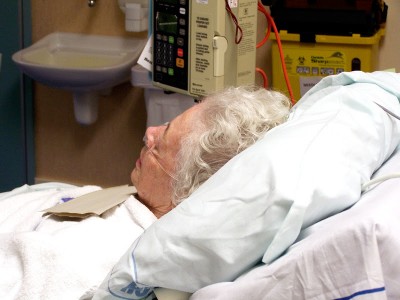I just returned home from Austin, Texas, where I testified against SB 303–a very bad bill that would permit doctors to force DNAR orders on patient’s charts without consent, requiring the patient to “appeal.” (“Do Not Attempt Resuscitation,” aka, DNR, Do Not Resuscitate.”)
 More on my testimony later. But relevant to the question, a new study shows improved results from CPR. From, “New Data to Consider in DNR Decisions,” by Judith Graham in the New York Times:
More on my testimony later. But relevant to the question, a new study shows improved results from CPR. From, “New Data to Consider in DNR Decisions,” by Judith Graham in the New York Times:
What has not been clear is what happened to older hospital patients who left the hospital after a cardiac arrest. Now a new study in The New England Journal of Medicine of 6,972 elderly people who survived in-hospital cardiac arrests between 2000 and 2008 gives some answers. A year after exiting the hospital, 58.5 percent of these older patients were still alive. Of this group, 48 percent had little or no neurological impairment, while 52 percent had moderate or severe neurological damage. Forty percent of older patients who survived CPR returned to life at home; the remaining 60 percent went to nursing homes, rehabilitation facilities or hospices.
And some of that data is more than ten years old, a long time in the medical field in which advancements come exponentially. Indeed, I am reading a fascinating book entitled Erasing Death, which is, among other issues, about the vast improvements in rehabilitation science and how innovative approaches are leading to amazing recoveries with restored function in people who would once have been “not only merely dead, but really most sincerely dead,” as the Wizard of Oz song lyric had it.
Germane to the Texas mess, Graham quotes a physician who properly notes that the issues of CPR and DNR are for patients to decide:
Older people and their families may want to use findings from this report in discussions about end-of-life care and preparing advance directives, which can include “do not resuscitate” orders.“I think physicians should discuss these results with patients and ask what their wishes are should their hearts stop,” Dr. Chan said. Unfortunately, there is no research on how elderly survivors of cardiac arrest rate their quality of life and whether they would choose resuscitation again if they had the opportunity, he noted.
“One of the most important questions to ask is, what is the older person’s current level of functional ability and cognitive status,” Dr. Abella said, observing that “elderly patients with good precardiac arrest function tend to do much better. If an older patient is cognitively intact and in reasonably good health, he or she might want to consider allowing resuscitative care,” Dr. Abella said. “But ultimately, this is a very personal, individualized decision.”
That is the very point I and other opponents of SB 303 made forcefully Tuesday in Austin: The DNR decision should be the patient’s, not the doctor’s or that of strangers meeting in a secret ethics committee deliberation!
Texas supporters of SB 303 claim they only want to prevent patient suffering. Fine. But I also think this has a lot to do with money. With Obamacare coming down the pike, I am not so sure that improved resuscitation results for elderly and other expensive patients will be a welcomed development among our Health Care Technocratic would-be overlords.
CLICK LIKE IF YOU’RE PRO-LIFE!
LifeNews.com Note: Wesley J. Smith, J.D., is a special consultant to the Center for Bioethics and Culture. Excerpted from his A Rat Is a Pig Is a Dog Is a Boy: The Human Cost of the Animal Rights Movement (Encounter, 2010). This post originally appeared at his blog Secondhand Smoke.







